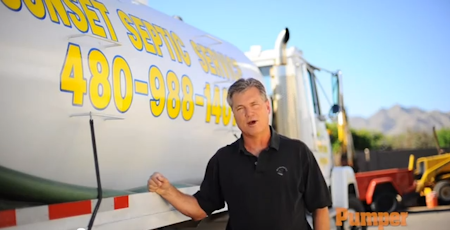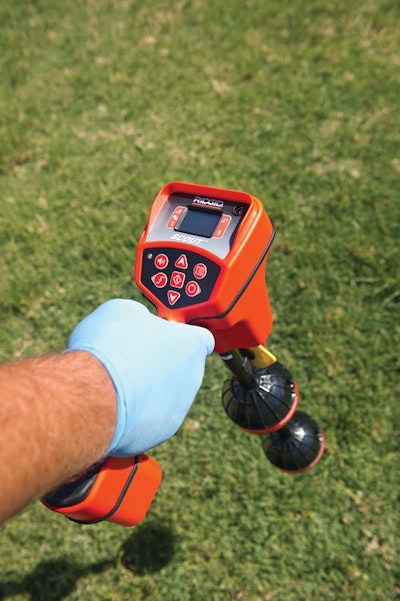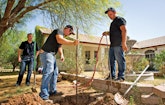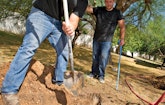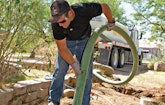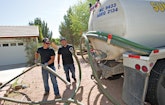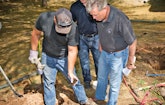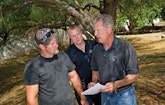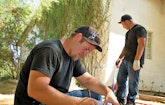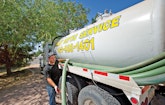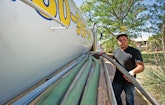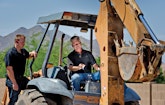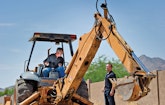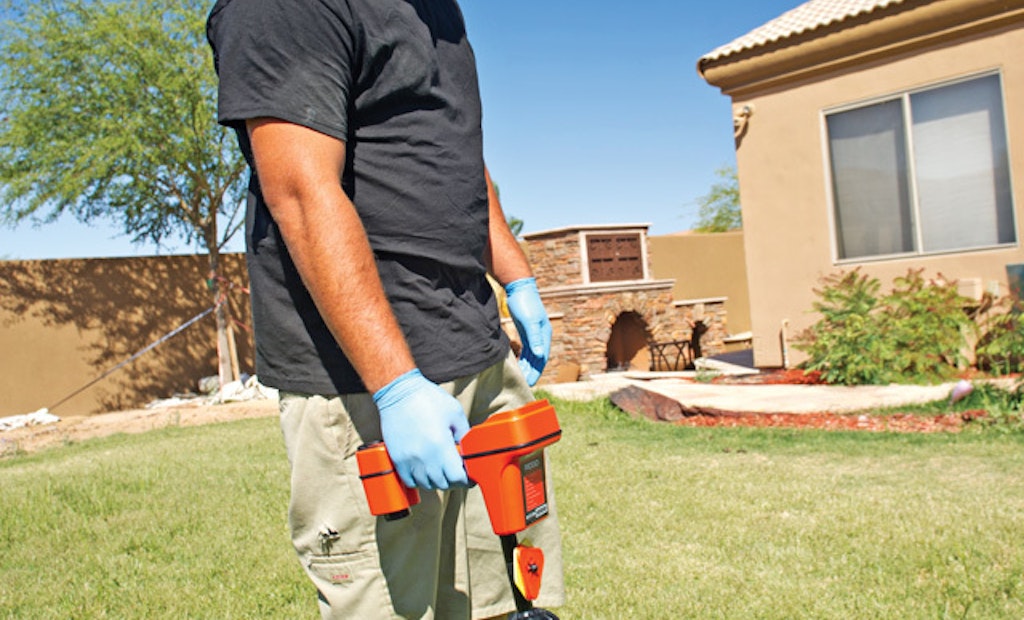Interested in Education/Training?
Get Education/Training articles, news and videos right in your inbox! Sign up now.
Education/Training + Get AlertsThe black cloud over J. Douglas Adcox, a homebuilder in Phoenix, Ariz., had a silver lining – the National Association of Wastewater Transporters’ inspector training course.
Before 2006, Adcox built 40 or more houses a year, and designed and installed the onsite systems. As demand for new homes plummeted to zero, he took the NAWT course to meet state regulations requiring certification of onsite installers. “I wanted my ducks in a row for when the building cycle reversed itself,” he says. “I had no other expectations or purpose.”
The decision, however, spun Adcox in an unforeseen direction that began his professional life as an onsite inspector for the transfer of real estate. From modest beginnings in late 2008, Sunset Septic Service tripled its revenue in 2009, then doubled it again in 2010. That year, a friend made it possible for Adcox to buy a used vacuum truck and branch into pumping septic tanks, then repairing onsite systems. While the pace of home construction remains stagnant in Arizona, business at Sunset Septic continues to accelerate.
DETOUR AHEAD
After Adcox graduated from Arizona State University with a degree in finance, he worked six years for a national homebuilder before starting his construction company, San Tan Homes, in 1989. He also was a real estate broker and member of SouthEast Valley Regional Association of Realtors. In 1996, he opened San Tan Realty. Since the state required no training to design and install onsite systems, Adcox added them to his construction business.
“Installing a system meant digging a hole, putting in the tank and making sure wastewater flowed by gravity from the house to the drainfield,” he says. “That was the extent of my knowledge.” Drainfields were constructed with 8-foot-deep trenches half filled with stone. Perforated 4-inch SDR35 PVC laterals were laid atop the gravel, then backfilled with native soil.
Adcox would draw a plot plan with components and sizes, then submit it to the Maricopa or Pinal County Health Department. “The plans always came back approved, but often with changes for the size of the tank and the number and length of the trenches,” he says. “Someone with some knowledge was overseeing the process.”
With the collapse of the housing market, Adcox watched his construction business go from flat out to flat broke. San Tan Realty provided a meager income. “I had weeks with nothing to do, so my son, Jason, and I became NAWT-certified inspectors in anticipation of building homes again,” Adcox says. “That was my only reason and my only goal.”
After Adcox certified in October 2008 and, unbeknownst to him, the Arizona Department of Environmental Quality added his name to its list of approved inspectors. Then the phone rang.
NEW OPPORTUNITIES
A woman who found Adcox’s name on the ADEQ website asked him to inspect her system for a property transfer. The request blindsided him. “I was certified and I knew how septic systems worked, but I honestly didn’t know what I was doing,” he says. Adcox almost refused, but decided otherwise.
After locating the woman’s septic tank, Adcox hired Eddie Cooper of Cooper’s Sewer and Drain in Apache Junction, Ariz., to pump it. “He’s very familiar with inspections and looked over my shoulder,” Adcox says. “As Eddie helped me fill out the ADEQ seven-page report, I knew I wanted to continue doing this.”
Soon afterward, Adcox was at a real estate title company and overheard that somebody needed a septic inspection to close the transaction. He asked for the phone number and landed the job. Three others followed in November. “It wasn’t enough to put food on the table or pay bills, but it was 100 percent more than what I had been doing,” Adcox says.
The work showed enough promise that Adcox decided to build a business around it. He listed sons Jason, 25, and Michael, 20, as owners of Sunset Septic Services and himself as manager. “The business is set up that way to bypass the first step of family succession,” he says. “It’s an apprenticeship for the boys on how to run a company with me guiding them and doing all the marketing.”
In March 2009, Adcox achieved his first short-term goal: earning $10,000 per month. “Actually, we surpassed it by $200,” he says. “That’s when I began to believe that we could turn this into our livelihood and pay some bills.” He threw himself into promoting the business.
At that time, real estate agents ordered 95 percent of all septic inspections. As a real estate broker, Adcox networked with colleagues, developed repeat Realtor customers who gave him orders, and watched the business grow.
RECESSION RESISTANT
Adcox achieved his next short-term goal – 20 inspections per month – later in 2009, and began contemplating purchasing a vacuum truck instead of paying Cooper or Green Arrow Environmental Services in Mesa to pump tanks. “It was apparent that inspections were not going to be a cyclical business tied to the economy,” he says. “While they aren’t recession proof, they certainly are recession resistant.”
Lacking credit to buy a truck from a dealer, Adcox asked Cooper if he had one for sale. He did, and the men agreed on a payment plan. Before shaking hands on the deal, Adcox asked Cooper why he had agreed to help a competitor.
“Eddie has a fantastic business and my activities would probably never hurt him,” Adcox says. “Nevertheless, he looked at me and said with a smile, ‘Somebody helped me years ago.’ ” In 2010, Cooper sold him a truck that he had built: a 1988 Freightliner with 3,000-gallon steel tank manufactured by Cashion Tank and Steel in Cashion, Ariz., and Jurop 260R pump.
To improve efficiency to serve growing demand, Adcox added a RIDGID Scout locator and a variety of tools from VAR Co., including a water probe, chisel and 24-inch hook to grab filters. He bought most of his accessories at the Pumper & Cleaner Environmental Expo International.
Adcox then hired two employees to drive the truck and pump tanks, while he and Jason did inspections, office work and built the business. They purchased Smart Service software, a service industry add-on for QuickBooks, and hired a part-time college student to input 300 to 400 inspection jobs stored on index cards filed in shoeboxes.
“Nothing was computerized,” Adcox says. “This program will help with data management and follow-ups.” To make new contacts, he mails letters introducing the staff and services, and includes refrigerator magnets with the company’s contact information.
“New inspection and pumping jobs generate 80 percent of our revenue, and the rest is repeat business or system repairs,” he says. “Therefore, the second stage of my business plan is service expansion.” The most obvious direction is contacting customers from three years ago and reminding them that they should have their tanks pumped out. The software will enable him to find those people and build repeat business.
SEEING CLEARLY
As Adcox did point-of-sale inspections, he saw more opportunity for business expansion in the broken baffles, inlet and outlet pipes sloping in the wrong directions, broken tanks and clogged drainfields. “We’re building our repair service by taking care of those problems,” Adcox says. “We seldom deal with homeowners, because banks own 75 to 80 percent of the properties.”
Ensuring that bankers and Realtors comprehend the ADEQ rating system of functional, functional with concerns or not functional is part of the job. “People can move into a home with a system rated functional with concerns provided they understand that if left unattended, most problems will one day back up into their house,” he says. “On the other hand, probably 98 percent of the time buyers will not close on properties if the onsite system isn’t working. We lay out the facts so bankers can decide whether to fix it.”
Adcox waits for such repair jobs to be offered rather than risk a conflict of interest or the appearance of impropriety. While some repairs are major, such as replacing tanks and drainfields, most are backflow issues caused by improper installations or backfilling. “Inspecting and repairing the work of others has made me a better installer,” he says. “I became much more aware of how things go wrong.”
The Sunset Septic vacuum truck is often on the road so much that Adcox calls Cooper’s or Green Arrow to help out. “My goal is to buy a second truck this year and hire a full-time office manager so I can focus on marketing,” he says. “My biggest challenge will be stabilizing revenue so it can support our employees at the level where they want to stay with the company.”
